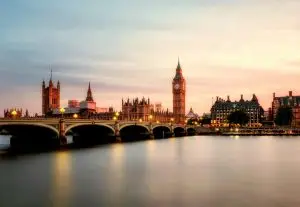Context
The Bus industry was particularly hard hit by the pandemic, as bus usage declined. In the year end March 2022, 2.8 billion total local bus passenger journeys were made in England, compared to 4.1 billion in the year ending March 2020.[1] The increasing popularity of home-working and online retail has made it difficult for the bus industry to bounce back. In response, bus companies have cut the least commercially viable routes, a strategy which has proved unpopular with local residents.[2] Against this background, the Government published the National Bus Strategy for England in March 2021.[3] This Strategy, which covers all of England outside London, promised lower, simpler bus fares, integrated services across transport modes, and contactless payments on all buses, among other commitments.[4] Since the Strategy was published, 76 out of 79 local transport authorities (LTAs), have formed an Enhanced Partnership, where local operators work with the LTA to plan local services.[5] The other three LTAs, Greater Manchester, Liverpool City Region and Cambridgeshire & Peterborough, have brought local services under public control by franchising bus services.[6] All 79 LTAs have published a local Bus Service Improvement Plan (BSIP), with 34 of those receiving Government funding to deliver their plan in full.[7]
Labour Party Response
The Labour Party has blamed the Government for the cuts to bus routes, in particular highlighting the Government’s insufficient funding and reluctance to devolve further powers over bus services to local authorities. In May 2022, Shadow Transport Minister Sam Tarry MP criticised the format of funding for BSIPs, with only 34 of 79 LTAs receiving funding.[8] Further, the total amount of money which LTAs asked for in their bids was £9 billion, while only £1.3 billion of funding was actually delivered.[9] Tarry’s successor as Shadow Transport Minister, Simon Lightwood MP, has continued his criticism of the Government’s underfunding of bus services, and the regional disparity created by the BSIP funding mechanism.[10]
Labour Party Policy
In their 2019 General Election Manifesto, Labour promised they would ‘ensure that councils can improve bus services by regulating and taking public ownership of bus networks’ and would ‘give them resources and full legal powers to achieve this cost-effectively’.[11] Labour also committed to introducing free bus travel for under-25s, and would reinstate the 3000 routes which had then been lost since 2010.[12] While new Labour Leader Keir Starmer has dropped the free bus travel for under-25s commitment,[13] the rest of the policy remains largely unchanged. In her 2022 Conference Speech, Shadow Transport Secretary Louise Haigh announced that an incoming Labour Government would give any LTA that wants it the power to franchise bus services, a power which is currently only available to Mayoral Combined Authorities.[14] In addition, she announced that Labour would end the ban on LTAs establishing their own municipal bus companies, introduced by the Bus Services Act 2017.[15] From March to May 2023, Haigh emphasised this policy as part of Labour’s 2023 local election campaign, blaming deregulation and privatisation for the decline in bus routes across England.[16][17] Haigh acknowledged that the franchising policy would increase costs, including to the Government, but claimed it would be more efficient than the present system.[18]
BREVIA CONSULTING PROVIDES STRAIGHTFORWARD POLITICAL ADVICE AND SUPPORT TO BUSINESSES AND ORGANISATIONS
Discover how Brevia can help you and your organisation by contacting the Brevia Team on 020 7091 1650 or contact@brevia.co.uk
[1] Department for Transport, Annual bus statistics: year ending March 2022 (revised), 14 March 2023, link
[2] The Guardian, Almost one in 10 local bus services, 24 January 2023, link
[3] Department for Transport, Bus Back Better: National Bus Strategy for England, 15 March 2021, link
[4] Department for Transport, Prime Minister launches £3 billion bus revolution, 15 March 2021, link
[5] Department for Transport, Written evidence submitted to Transport Committee Inquiry: National bus strategy: one year on, p.8, 28 April 2022, link
[6] Ibid
[7] Department for Transport, Written evidence submitted to Transport Committee Inquiry: National bus strategy: one year on, p.9, 28 April 2022, link
[8] Sam Tarry MP, Hansard, 19 May 2022, Col. 872, link
[9] Ibid
[10] Simon Lightwood MP, Hansard, 8 June 2023, Col. 862, link
[11] Labour Party, It’s Time for Real Change: The Labour Party Manifesto 2019, 21 November 2019, pp.18-19, link
[12] Ibid
[13] Mail Online, Keir Starmer ditches ANOTHER Labour pledge of free bus travel for under-25s as he says Britain would be better if Corbyn had become PM… before heading to Davos summit, 16 January 2023, link
[14] Labour Party, Louise Haigh Conference Speech, 26 September 2022, link
[15] Ibid
[16] Mirror, Labour pledges biggest bus service overhaul in a generation after Tory ‘managed decline’, 27 April 2023, link
[17] The Guardian, Labour vows biggest bus overhaul in 40 years with new powers over operators¸ 9 March 2023, link
[18] Ibid



